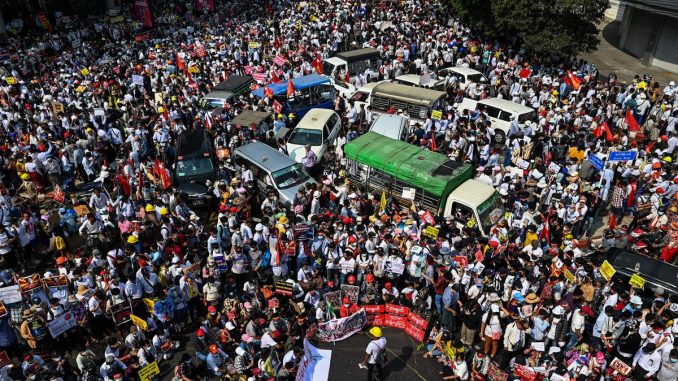
Introduction
In Myanmar, the struggle for democracy has taken center stage once again as pro-democracy protesters continue to defy a brutal military crackdown that seeks to suppress their voices. The nation, formerly known as Burma, has a long and complex history of political turmoil, and the current wave of protests is yet another chapter in the ongoing quest for freedom and self-determination. This article delves into the evolving situation in Myanmar, where courageous citizens are standing up for their rights in the face of adversity.
A Background on Myanmar’s Political History
Myanmar’s modern history is marked by a series of political shifts and conflicts. Decades of military rule came to an end in 2011 when the country began a transition towards democracy. Aung San Suu Kyi, a symbol of democracy and human rights, played a central role in this transformation. Her National League for Democracy (NLD) won a landslide victory in the 2015 elections, bringing hope for a new era of civilian rule.
The February 2021 Coup
However, on February 1, 2021, Myanmar’s fragile democracy took a dramatic and disheartening turn when the military, led by General Min Aung Hlaing, staged a coup, alleging unfounded election fraud. Aung San Suu Kyi and other leaders of the NLD were detained, and the military declared a year-long state of emergency.
The coup was met with widespread condemnation from the international community, which urged the military to restore civilian rule. Sanctions and diplomatic pressure followed, but the junta remained in control.
Resilient Pro-Democracy Protests
Despite the military’s crackdown on dissent, pro-democracy protesters across Myanmar took to the streets in peaceful demonstrations. They demanded the restoration of democracy, the release of political prisoners, and an end to military rule.
These protests quickly gained momentum, drawing diverse crowds of young and old, students, professionals, and ethnic minorities. Civil disobedience movements saw government workers, including doctors, teachers, and civil servants, refuse to work under the illegitimate regime.
A Brutal Crackdown
In response to the protests, the military unleashed a brutal crackdown. Security forces used tear gas, rubber bullets, and live ammunition against unarmed demonstrators. Reports of human rights abuses, including extrajudicial killings and torture, have emerged, sparking international outrage.
Despite the escalating violence, Myanmar’s pro-democracy movement has remained resilient. Demonstrators continue to march in the streets, expressing their unwavering commitment to democratic principles and their rejection of military rule.
International Response
The international community has responded to the crisis with a mixture of condemnation, sanctions, and diplomatic efforts. Countries around the world have imposed targeted sanctions on Myanmar’s military leaders and entities with ties to the junta. The United Nations and regional organizations have called for dialogue and a peaceful resolution to the crisis.
Efforts to negotiate between the military and civilian leaders have faced significant challenges. The junta’s continued repression and the NLD’s insistence on the restoration of democracy have created a political impasse.
The Road Ahead
The situation in Myanmar remains fluid and deeply concerning. Pro-democracy protesters continue to risk their lives to stand up for their rights and aspirations. The international community’s support for their cause remains critical.
As the crisis unfolds, it is clear that the people of Myanmar are determined to shape their own destiny and determine the course of their nation’s political future. The struggle for democracy in Myanmar serves as a poignant reminder of the enduring human spirit in the face of oppression and the universal desire for freedom, justice, and self-determination.